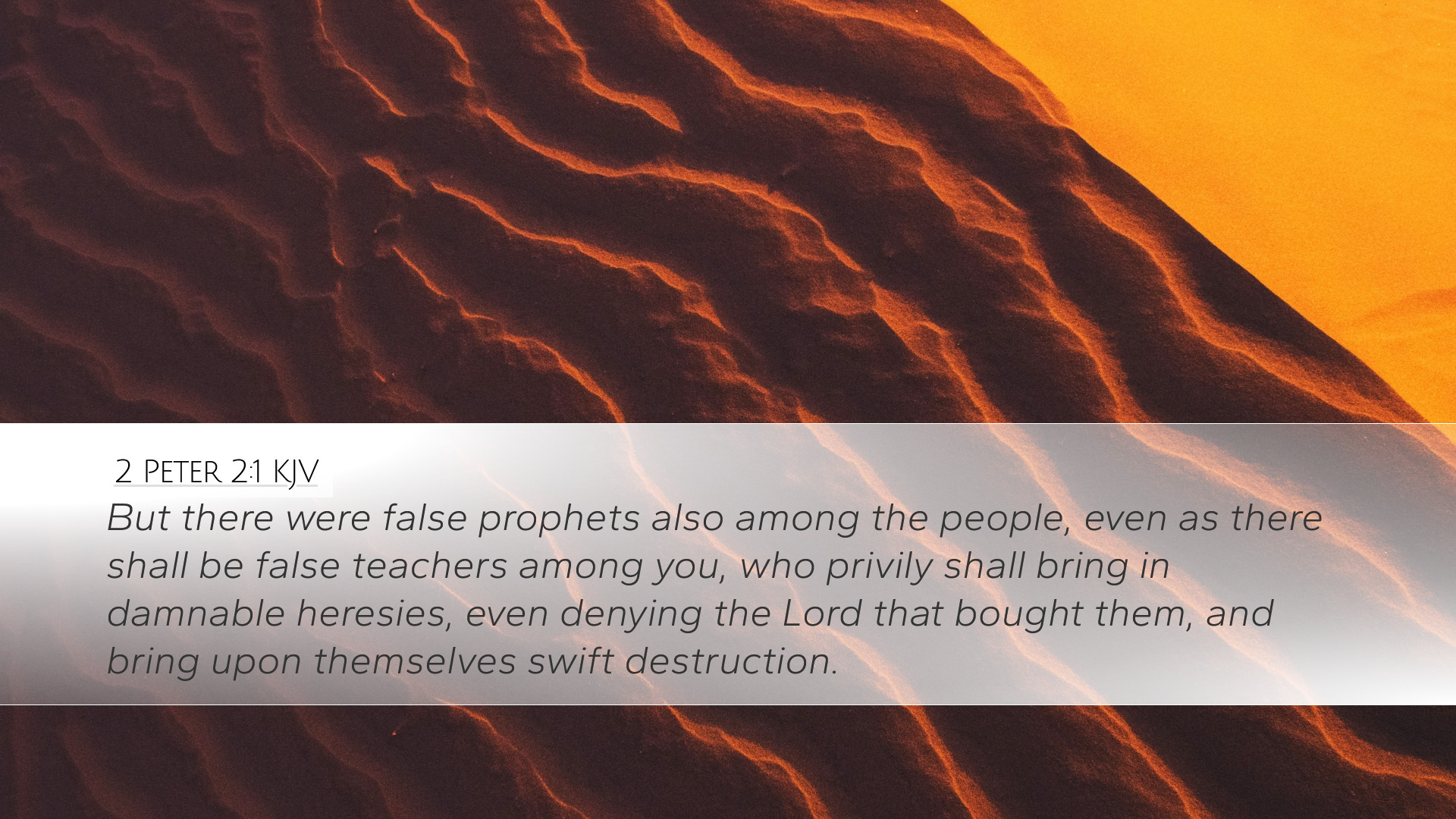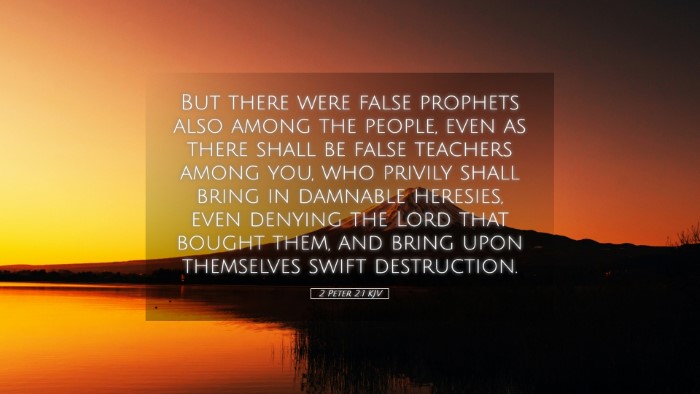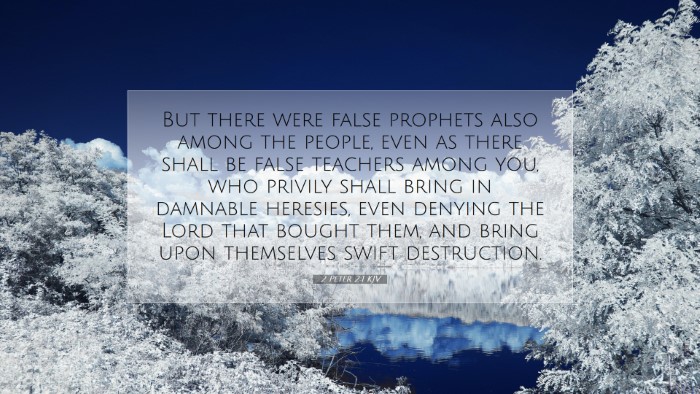Old Testament
Genesis Exodus Leviticus Numbers Deuteronomy Joshua Judges Ruth 1 Samuel 2 Samuel 1 Kings 2 Kings 1 Chronicles 2 Chronicles Ezra Nehemiah Esther Job Psalms Proverbs Ecclesiastes Song of Solomon Isaiah Jeremiah Lamentations Ezekiel Daniel Hosea Joel Amos Obadiah Jonah Micah Nahum Habakkuk Zephaniah Haggai Zechariah Malachi2 Peter 2:1
2 Peter 2:1 KJV
But there were false prophets also among the people, even as there shall be false teachers among you, who privily shall bring in damnable heresies, even denying the Lord that bought them, and bring upon themselves swift destruction.
2 Peter 2:1 Bible Commentary
Commentary on 2 Peter 2:1
Verse Context: 2 Peter 2:1 states, “But there were false prophets also among the people, even as there shall be false teachers among you, who privily shall bring in damnable heresies, even denying the Lord that bought them, and bring upon themselves swift destruction.” This verse serves as a pivotal warning against deception within the church, and understanding it requires a multifaceted approach informed by historical and theological insights.
Overview of False Prophets
In this passage, the Apostle Peter warns the early church about the inevitable presence of false teachers, paralleling them with the false prophets found among the Israelites. The historical context is essential for grasping the seriousness of Peter's admonition.
- Matthew Henry: Describes false prophets as individuals who corrupt the truth, reflecting the same behavior seen during the days of the Old Testament. He emphasizes their secretive nature, suggesting they begin with a semblance of truth yet diverge into heresy.
- Albert Barnes: Focuses on the idea of “damnable heresies,” noting that these are teachings that lead people away from the true faith and may result in eternal separation from God. Barnes highlights that these teachers often plead ignorance or mislead others under the guise of wisdom.
- Adam Clarke: Points out the distinction between false prophets of the Old Testament and the New Testament false teachers. Clarke stresses that the latter are identified within the church itself, making their deception more dangerous as it emerges within the community of believers.
The Nature of False Teachings
The specific heresies mentioned by Peter are marked by a denial of Christ’s lordship, a theme that resonates deeply with New Testament teachings. The implication is that these teachings not only distort the truth but also aggressively oppose the foundational tenets of Christian faith.
- Matthew Henry: Notes that to deny Christ is to undermine the very foundation of salvation. He interprets “the Lord that bought them” as referring to Christ’s redemptive work, indicating that those who teach heresies may have a form of faith but ultimately do not reflect true understanding or commitment to Christ.
- Albert Barnes: Suggests that this denial is not merely theoretical but has practical ramifications, leading to a lifestyle contrary to the teachings of Christ. He believes that these deceptive teachings develop a systematic departure from genuine discipleship.
- Adam Clarke: Argues that this denial could stem from ignorance or willful rebellion. Clarke’s analysis points to the varied motives behind false teachings, from greed for power, influence, or financial gain, showing that both character and intention play significant roles in these corruptions of faith.
The Consequences of False Teaching
Peter warns that the consequences of following such false teachers lead not only to moral decay but also to divine judgment. The phrase “swift destruction” emphasizes the urgency and severity of God's response to such apostasy.
- Matthew Henry: Affirms that judgment will come upon these false prophets. He warns the faithful that while these individuals may appear successful, their end is destined for swift and comprehensive ruin. His interpretation aids in highlighting the danger of complacency in the face of false teachings.
- Albert Barnes: Discusses the implications for those who follow such teachers, noting that they will also share in the resulting destruction. He encourages believers to remain vigilant and discerning to prevent falling prey to deceit.
- Adam Clarke: Expands on the theme of judgment, suggesting that the actions of false teachers prompt a divine response which serves as an example for others. Clarke's perspective helps reinforce the gravity of the situation by linking the behavior of false teachers to the moral health of the church.
Application for the Church Today
This warning from Peter is timeless and speaks to modern congregations about the need for discernment and reliance on sound teaching. In a world rife with varied beliefs and teachings, the call to evaluate doctrine aligns with Peter’s directive.
- Matthew Henry: Encourages believers to ground themselves in the Scriptures and to look for sound doctrine that upholds the core tenets of Christianity. A deep understanding of Scripture serves as a guard against deception.
- Albert Barnes: Reminds church leaders to be diligent in teaching the word accurately, as they bear the responsibility of guiding their flocks through an increasingly confusing spiritual landscape.
- Adam Clarke: Advocates for an active engagement with theology and Scripture study, urging believers to cultivate a personal relationship with Christ that fosters recognition of truth from falsehood.
Conclusion
2 Peter 2:1 serves as a critical exhortation regarding the nature of false teachings and their consequences within the church. The insights gleaned from the commentaries of Matthew Henry, Albert Barnes, and Adam Clarke provide a comprehensive understanding of this verse’s implications for both the early church and contemporary believers.
As pastors, students, theologians, and scholars grapple with the complexities of faith today, the imperative to uphold true doctrine remains paramount for the health of the church. Engaging with the Scriptures and discerning truth from error will safeguard believers from the perils of false teachings.


